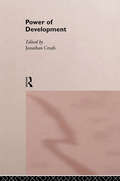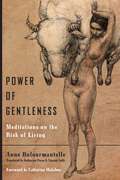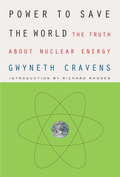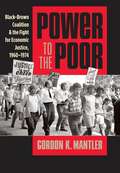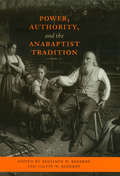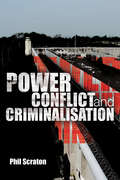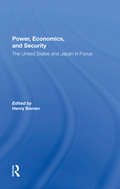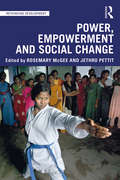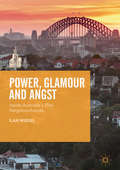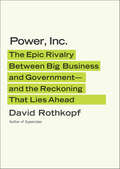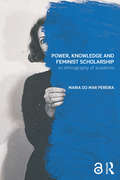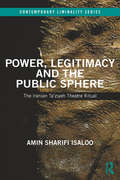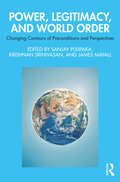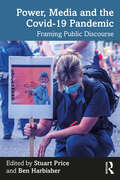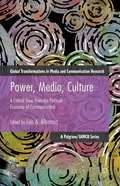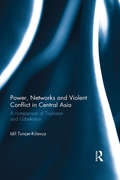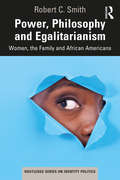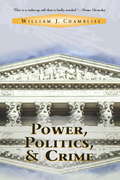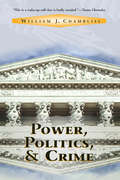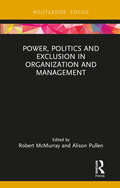- Table View
- List View
Power of Development
by Jonathan CrushPost-colonial, post-modern and feminist critiques have challenged the ways we theorise and practice development. Development is not just the conclusion of economic logic; its histories reveal a legacy of contested power, illuminating the contemporary battlefields of knowledge. These essays explore the language of development, its rhetoric and meaning within different political and institutional contexts. The contested ideas behind world development are explained, with illustrative material, sensitive to place and time, chiefly drawn from Asia, Africa and Latin America. This book examines the power of development to imagine new worlds and to constantly reinvent itself as the solution to problems of national and global disorder.
Power of Gentleness: Meditations on the Risk of Living
by Anne DufourmantelleGentleness is an enigma. Taken up in a double movement of welcoming and giving, it appears on the threshold of passages signed off by birth and death. Because it has its degrees of intensity, because it is a symbolic force, and because it has a transformative ability over things and beings, it is a power. The simplicity of gentleness is misleading. It is an active passivity that may become an extraordinary force of symbolic resistance and, as such, become central to both ethics and politics. Gentleness is a force of secret life-giving transformation linked to what the ancients called potentiality.In our day, gentleness is sold to us under its related form of diluted mawkishness. By infantilizing it our era denies it. This is how we try to overcome the high demands of its subtlety—no longer by fighting it, but by enfeebling it. Language itself is therefore perverted: what our society intends to give the human beings that it crushes “gently,” it does in the name of the highest values: happiness, truth, security.From listening to those who come to me and confide their despair, I have heard it expressed in every lived experience. I have felt its force of resistance and its intangible magic. In mediating its relation to the world, it appears that its intelligence carries life, saves and amplifies it.
Power of Scandal
by P. Johannes Ehrat, SJAre there events that are inherently scandalous? Power of Scandal finds that the very idea of 'scandal' is derived not from an event, but from public opinion - which, in turn, is construed by media narratives. Scandal is powerful because of its ability to challenge institutions by destabilizing their legitimacy. The media plays an integral role in the creation of scandal because it interprets real events as purposeful actions for the public. Examining the ubiquity of scandals in today's mass media, Johannes Ehrat's conclusions are fresh and surprising.Ehrat applies classic semiotic and pragmatic thought to contemporary media issues, mainly moralist discourse from sex abuse cases to the phenomenon of televangelism. Arguing that sociological and communications studies of scandal have ignored the media's constructed nature, Ehrat focuses on how meaningful public narrative is produced. By examining the parallel worlds of media and public opinion, Power of Scandal uses an alternative heuristic for understanding mass communication that is both rigorous and sophisticated.
Power to Save the World
by Gwyneth CravensAn informed look at the myths and fears surrounding nuclear energy, and a practical, politically realistic solution to global warming and our energy needs. Faced by the world's oil shortages and curious about alternative energy sources, Gwyneth Cravens skeptically sets out to find the truth about nuclear energy. Her conclusion: it is a totally viable and practical solution to global warming. In the end, we see that if we are to care for subsequent generations, embracing nuclear energy is an ethical imperative.
Power to Save the World: The Truth About Nuclear Energy
by Gwyneth CravensAn informed look at the myths and fears surrounding nuclear energy, and a practical, politically realistic solution to global warming and our energy needs. Faced by the world's oil shortages and curious about alternative energy sources, Gwyneth Cravens skeptically sets out to find the truth about nuclear energy. Her conclusion: it is a totally viable and practical solution to global warming. In the end, we see that if we are to care for subsequent generations, embracing nuclear energy is an ethical imperative.
Power to the Poor
by Gordon K. MantlerThe Poor People's Campaign of 1968 has long been overshadowed by the assassination of its architect, Dr. Martin Luther King Jr., and the political turmoil of that year. In a major reinterpretation of civil rights and Chicano movement history, Gordon K. Mantler demonstrates how King's unfinished crusade became the era's most high-profile attempt at multiracial collaboration and sheds light on the interdependent relationship between racial identity and political coalition among African Americans and Mexican Americans. Mantler argues that while the fight against poverty held great potential for black-brown cooperation, such efforts also exposed the complex dynamics between the nation's two largest minority groups. Drawing on oral histories, archives, periodicals, and FBI surveillance files, Mantler paints a rich portrait of the campaign and the larger antipoverty work from which it emerged, including the labor activism of Cesar Chavez, opposition of Black and Chicano Power to state violence in Chicago and Denver, and advocacy for Mexican American land-grant rights in New Mexico. Ultimately, Mantler challenges readers to rethink the multiracial history of the long civil rights movement and the difficulty of sustaining political coalitions.
Power, Authority, and the Anabaptist Tradition (Center Books in Anabaptist Studies)
by Benjamin W. Redekop and Calvin W. RedekopFounded in part on a rejection of "worldly" power and the use of force, Anabaptism carried with it the promise of redemptive power. Yet the attempt to banish worldly power to the margins of the Christian community has been fraught with dilemmas, contradictions, and, at times, blatant abuses of authority. In this groundbreaking book, Benjamin W. Redekop, Calvin W. Redekop, and their coauthors draw on classic and contemporary thinking to confront the issue of power and authority in the Anabaptist-Mennonite community. From the power relationships of the sixteenth-century Peasants' War to issues of contemporary sexuality, the topics of Power, Authority, and the Anabaptist Tradition are sure to interest a wide audience.Contributors: Stephen C. Ainlay, College of the Holy Cross • J. Lawrence Burkholder, President Emeritus, Goshen College • Lydia Neufeld Harder, Toronto School of Theology • Joel Hartman, University of Missouri • Jacob A. Loewen, missionary, retired • Dorothy Yoder Nyce, Writer and former Assistant Professor, Goshen College • Lynda Nyce, Bluffton College • Wesley Prieb (deceased), former dean, Tabor College • Benjamin W. Redekop, Kettering University • Calvin W. Redekop, Conrad Grebel College, emeritus • James M. Stayer, Queen's University, Ontario
Power, Conflict and Criminalisation
by Phil ScratonDrawing on a body of empirical, qualitative work spanning three decades, this unique text traces the significance of critical social research and critical analyses in understanding some of the most significant and controversial issues in contemporary society. Focusing on central debates in the UK and Ireland – prison protests; inner-city uprisings; deaths in custody; women’s imprisonment; transition in the north of Ireland; the ‘crisis’ in childhood; the Hillsborough and Dunblane tragedies; and the ‘war on terror’ – Phil Scraton argues that ‘marginalisation’ and ‘criminalisation’ are social forces central to the application of state power and authority. Each case study demonstrates how structural relations of power, authority and legitimacy, establish the determining contexts of everyday life, social interaction and individual opportunity. This book explores the politics and ethics of critical social research, making a persuasive case for the application of critical theory to analysing the rule of law, its enforcement and the administration of criminal justice. It is indispensable for students in the fields of criminology, criminal justice and socio-legal studies, social policy and social work.
Power, Economics, And Security: The United States And Japan In Focus
by Henry BienenThis volume is dedicated to the memory of Klaus E. Knorr. Thisis fitting for a number of reasons. The collaborative work herewas done under the auspices of the Center of International Studiesat Princeton University, which Klaus Knorr directed from 1961until 1968. The concerns of this book are to analyze the relationshipsamong economic and military power and national security; to explorethe ways economic power and economic decline relate to internationalhegemony; and to examine our understanding of concepts such aspower, security, and burden-sharing. These concerns ranked highon Klaus Knorr's research agenda during his productive and fruitfullife.
Power, Empowerment and Social Change (Rethinking Development)
by Rosemary McGee Jethro PettitThis book uncovers how power operates around the world, and how it can be resisted or transformed through empowered collective action and social leadership. The stakes have never been higher. Recent years have seen a rapid escalation of inequalities, the rise of new global powers and corporate interests, increasing impunity of human rights violations, suppression of civil society, and a re-shaping of democratic processes by post-truth, populist and nationalist politics. Rather than looking at power through the lenses of agency or structure alone, this book views power and empowerment as complex and multidimensional societal processes, defined by pervasive social norms, conditions, constraints and opportunities. Bridging theory and practice, the book explores real-world applications using a selection of frameworks, tools, case studies, examples, resources and reflections from experience to support actors to analyse their positioning and align themselves with progressive social forces. Compiled with social change practitioners, students and scholars in mind, Power, Empowerment and Social Change is the perfect volume for anyone involved in politics, international development, sociology, human rights and environmental justice who is looking for fresh insights for transforming power in favour of relatively less powerful people.
Power, Glamour and Angst: Inside Australia's Elite Neighbourhoods (The Contemporary City)
by Ilan WieselPower, Glamour and Angst is about the social and cultural life of three Australian neighbourhoods – Toorak (Melbourne), Mosman (Sydney) and Cottesloe (Perth) - which are home to some of the nation’s wealthiest and most powerful citizens. The book explores how living in these neighbourhoods shapes the lifestyles, social networks and status of Australia’s elites. The book explores the everyday rituals through which residents produce their neighbourhood's status. It maps residents’ social networks and exposes the local institutions – including schools and sports or social clubs – in which access to such high-powered networks is granted or withheld. Power, Glamour and Angst examines how the collective social and cultural capitals of elite neighbourhoods are mobilised towards varied objectives, from initiation of business connections and opportunities, through to opposition against unwanted development or traffic, both sources of ongoing angst. Deeply conservative and resistant to change at their core, despite their wealth and power these communities have not always been successful in fully repressing external pressures. In the 21st century Australian city, even elite neighbourhoods must learn to adapt to population growth, urban densification and increased cultural diversity.
Power, Inc.: The Epic Rivalry Between Big Business and Government—and the Reckoning That Lies Ahead
by David RothkopfThe world's largest company, Wal-Mart Stores, has revenues higher than the GDP of all but twenty-five of the world's countries. Its employees outnumber the populations of almost a hundred nations. The world's largest asset manager, a secretive New York company called Black Rock, controls assets greater than the national reserves of any country on the planet. A private philanthropy, the Bill and Melinda Gates Foundation, spends as much worldwide on health care as the World Health Organization. The rise of private power may be the most important and least understood trend of our time. David Rothkopf provides a fresh, timely look at how we have reached a point where thousands of companies have greater power than all but a handful of states. Beginning with the story of an inquisitive Swedish goat wandering off from his master and inadvertently triggering the birth of the oldest company still in existence, Power, Inc. follows the rise and fall of kings and empires, the making of great fortunes, and the chaos of bloody revolutions. A fast-paced tale in which champions of liberty are revealed to be paid pamphleteers of moneyed interests and greedy scoundrels trigger changes that lift billions from deprivation, Power, Inc. traces the bruising jockeying for influence right up to today's financial crises, growing inequality, broken international system, and battles over the proper role of government and markets.Rothkopf argues that these recent developments, coupled with the rise of powers like China and India, may not lead to the triumph of American capitalism that was celebrated just a few years ago. Instead, he considers an unexpected scenario, a contest among competing capitalisms offering different visions for how the world should work, a global ideological struggle in which European and Asian models may have advantages. An important look at the power struggle that is defining our times, Power, Inc. also offers critical insights into how to navigate the tumultuous years ahead.
Power, Knowledge and Feminist Scholarship: An Ethnography of Academia (Transformations)
by Maria do Mar PereiraFeminist scholarship is sometimes dismissed as not quite ‘proper’ knowledge – it’s too political or subjective, many argue. But what are the boundaries of ‘proper’ knowledge? Who defines them, and how are they changing? How do feminists negotiate them? And how does this boundary-work affect women’s and gender studies, and its scholars’ and students’ lives? These are the questions tackled by this ground-breaking ethnography of academia inspired by feminist epistemology, Foucault, and science and technology studies. Drawing on data collected over a decade in Portugal and the UK, US and Scandinavia, this title explores different spaces of academic work and sociability, considering both official discourse and ‘corridor talk’. It links epistemic negotiations to the shifting political economy of academic labour, and situates the smallest (but fiercest) departmental negotiations within global relations of unequal academic exchange. Through these links, this timely volume also raises urgent questions about the current state and status of gender studies and the mood of contemporary academia. Indeed, its sobering, yet uplifting, discussion of that mood offers fresh insight into what it means to produce feminist work within neoliberal cultures of academic performativity, demanding increasing productivity. As the first book to analyse how academics talk (publicly or in off-the-record humour) about feminist scholarship, Power, Knowledge and Feminist Scholarship is essential reading for scholars and students in gender studies, LGBTQ studies, post-colonial studies, STS, sociology and education. Winner of the FWSA 2018 Book Prize competition The Open Access version of this book, available at https://doi.org/10.4324/9781315692623, has been made available under a Creative Commons Attribution-Non Commercial-No Derivatives 4.0 license.
Power, Legitimacy and the Public Sphere: The Iranian Ta’ziyeh Theatre Ritual (Contemporary Liminality)
by Amin Sharifi IsalooA ground-breaking study of political transformations in non-Western societies, this book applies anthropological, sociological and political concepts to the recent history of Iran to explore the role played by a ritual theatrical performance (Ta’ziyeh) and its symbols on the construction of public mobilisations. With particular attention to three formative phases – the 1978–79 Islamic Revolution, the 1980–88 Iran–Iraq War, and the 2009 Green Movement – the author concentrates on the relations between symbols of the ritual performance and the public sphere to shed light on the ways in which the symbols of Ta’ziyeh were used to claim political legitimacy. Thus, the book elucidates how symbols and images of a ritual performance can be utilised by ‘tricksters’, such as political actors and fanatical religious leaders, to take advantage of the prolongation of a state of transition within a society, and so manipulate the public in order to mobilise crowds and movements to fulfil their own interests and concerns. An insightful analysis of political mobilisation explained in terms of a set of interrelated master concepts such as ‘liminality’, ‘trickster’ and ‘schismogenesis’, Power, Legitimacy and the Public Sphere integrates theoretical, empirical and ‘diagnostic’ perspectives in order to investigate and illustrate links between the public sphere and religious and cultural rituals. As such, it will appeal to scholars of sociology, politics and anthropology with interests in social theory, public mobilisations and political transformation.
Power, Legitimacy, and World Order: Changing Contours of Preconditions and Perspectives
by Sanjay Pulipaka, Krishnan Srinivasan, and James MayallThis book reflects on the reasons for the decline of international cooperation in world politics and studies ways to restore legitimacy in the international order. It engages with the concept of legitimacy in international relations theories and practices to examine the discussions around power shifts, the decline of liberalism, demands for inclusive international architectures, and challenges to multilateralism, as well as established norms by leaders and nationalisms. It studies the impact of the post-COVID-19 world order on the nature of power in the international system and changes in normative concerns of security. The volume also interrogates political legitimacy through an area studies lens by examining the concept of legitimacy separately in the USA, Europe, South Asia, Southeast Asia, Latin America, and Africa. An important and timely text featuring contributions from eminent scholars, this book will be of use to students and researchers of modern history, political science, and international relations. It will also be of interest to think tanks and policy-making bodies concerned with international affairs and foreign policy.
Power, Media and the Covid-19 Pandemic: Framing Public Discourse
by Stuart Price and Ben HarbisherThis edited collection provides an in-depth, interdisciplinary critique of the acts of public communication disseminated during a major global crisis. Encompassing contributions from academics working in the fields of politics, environmentalism, citizens’ rights, state theory, cultural studies, journalism, and discourse/rhetoric, the book offers an original insight into the relationship between the various social forces that contributed to the ‘Covid narrative’. The subjects analysed here include: the performance of the ‘mainstream’ media, the quality of political ‘messaging’ and argumentation, the securitised state and racism in Brazil, the growth of ‘catastrophic management’ in UK universities, emergent journalistic practices in South Africa, homelessness and punitive dispossession, the pandemic and the history of eugenics, and the Chinese media’s attempt to disguise discriminatory practices. This is one of the first comparative studies of the various rationales offered for state/corporate intervention in public life. Delving beneath established political tropes and state rhetoric, it identifies the power relations exposed by an event that was described as unprecedented and unique, but was in fact comparable to other major global disruptions. As governments insisted on distinguishing their own propaganda from unregulated disinformation, their increasingly sceptical ‘publics’ pursued their own idiosyncratic solutions to the crisis, while the apparent sacrifice of a host of citizens – from the most dedicated to the most vulnerable – suggested that inequality and exploitation remained at the heart of the social order. Power, Media, and the Covid-19 Pandemic is essential reading for students, researchers and academics in media, communication and journalism studies, politics, environmental sciences, critical discourse analysis, cultural studies, and the sociology of health.
Power, Media, Culture
by Luis A. AlbornozThis book updates and revalidates critical political economy of communication approaches. It is destined to become a work of reference for those interested in delving into debates arising from the performance of traditional and new media, cultural and communication policy-making or sociocultural practices in the new digital landscape.
Power, Networks and Violent Conflict in Central Asia: A Comparison of Tajikistan and Uzbekistan
by Idil Tunçer-KılavuzWhen the five Central Asian republics gained independence from the Soviet Union in 1991, expectations of violent conflict were widespread. Indeed, the country of Tajikistan suffered a five-year civil war from 1992 to 1997. The factors that the literature on civil wars in general and on the Tajikistan civil war in particular cites as the causes of war were also present in Uzbekistan – but this country had a peaceful transition. Examining this empirical puzzle by isolating the crucial factors that caused war to break out in Tajikistan but not Uzbekistan, this book applies a powerful comparative approach to the broader question of why civil wars occur. Based on fieldwork in both countries, it challenges many common explanations of civil war both generally and in Tajikistan in particular. This includes highlighting the importance of elites’ power perceptions, which have their origins in the interaction of structural-, process-, and network-related variables. Without examining these interactions, macro-structural explanations alone cannot explain the occurrence of civil war in one country and its absence in another. Applying the insights of bargaining theories of war from the literature on international relations to the civil war in Tajikistan, this book will be of interest to students of violent conflict, civil wars, Central Asia and Asian Politics.
Power, Philosophy and Egalitarianism: Women, the Family and African Americans (Routledge Series on Identity Politics)
by Robert C. SmithIn this book, Robert C. Smith presents a philosophical and empirical examination on the subordination of women and blacks in the United States. Comparing liberalism—specifically the major social contract philosophies—and Marxism on the nature of the subordination of blacks and women and their proposals, if any, for women’s and black liberation, Smith argues that sexual and racial equalitarianism in the United States is about politics and power. He begins with a discussion of the multiple meanings of politics and its relationship to power, and an analysis of nine power bases blacks and women should acquire and manipulate in order to advance a moral and substantive equalitarianism. These power bases include money, knowledge (including technology and information), religion, morality, authority, size/solidarity, charisma, violence and status. Smith concludes by making a moral case for racial and sexual equalitarianism and advocates for black leadership to use the power bases available to it to make reparations for the civil rights issue of the 21st century. Power, Philosophy and Egalitarianism is an essential read for all those interested in race, women and politics today.
Power, Politics And Crime
by William J ChamblissIn the United States today, we are on the verge of fulfilling a nightmare scenario. Parents are fearful of letting their children play in their own yards and elderly people are afraid to leave their homes. The bogeyman in this rampant panic about crime is the young black male, who, in the media and public image, is a "superpredator" lurking on every street corner ready to attack any prey that is vulnerable. But is crime in America really as bad as the public has been made to believe?Power, Politics, and Crime argues that the current panic over crime has been manufactured by the media, law enforcement bureaucracies, and the private prison industry. It shows how the definition of criminal behavior systematically singles out the inner-city African American. But urban minorities aren't the only victims. Although crime rates have been declining for 25 years, vast amounts of money pour into the criminal justice-industrial complex, diverting scarce resources from other social services such as education, social welfare, and health care. While in recent years downsizing has affected almost every segment of the public sector, the criminal justice bureaucracies have seen an unprecedented expansion.Through ethnographic observations, analysis of census data, and historical research, William Chambliss describes what is happening, why it has come about, and what can be done about it. He explores the genesis of crime as a political issue, and the effect that crime policies have had on different segments of the population. The book is more than a statement about the politics of crime and punishment-it's a powerful indictment of contemporary law enforcement practices in the United States.In addition to updating the data the author has added a discussion of the "declining crime rate." Contrary to presentations in the media and by law enforcement agencies, the rate has been declining for over 25 years and therefore cannot be attributed to any "get tough on crime" policies so dear to the hearts of prosecutors and politicians. Chapter Seven, "Crime Myths and Smokescreens" has been completely revised and updated. Updates include a discussion of the recent scandal in the Los Angeles Police Department which has resulted in criminal charges against police officers and the release of numerous convicted felons because of falsified evidence and testimony on the part of police officers. The attack on Louima in the police station in New York as well as the shooting of Diallo are discussed in some detail as well as other recent exposures of police brutality and corruption. The sections on white collar, corporate, and state crimes have been updated and recent examples added to the text.
Power, Politics And Crime
by William J ChamblissIn the United States today, we are on the verge of fulfilling a nightmare scenario. Parents are fearful of letting their children play in their own yards and elderly people are afraid to leave their homes. The bogeyman in this rampant panic about crime is the young black male, who, in the media and public image, is a "superpredator” lurking on every street corner ready to attack any prey that is vulnerable. But is crime in America really as bad as the public has been made to believe?Power, Politics, and Crime argues that the current panic over crime has been manufactured by the media, law enforcement bureaucracies, and the private prison industry. It shows how the definition of criminal behavior systematically singles out the inner-city African American. But urban minorities aren’t the only victims. Although crime rates have been declining for 25 years, vast amounts of money pour into the criminal justice-industrial complex, diverting scarce resources from other social services such as education, social welfare, and health care. While in recent years downsizing has affected almost every segment of the public sector, the criminal justice bureaucracies have seen an unprecedented expansion. Through ethnographic observations, analysis of census data, and historical research, William Chambliss describes what is happening, why it has come about, and what can be done about it. He explores the genesis of crime as a political issue, and the effect that crime policies have had on different segments of the population. The book is more than a statement about the politics of crime and punishment--it’s a powerful indictment of contemporary law enforcement practices in the United States. In addition to updating the data the author has added a discussion of the "declining crime rate. " Contrary to presentations in the media and by law enforcement agencies, the rate has been declining for over 25 years and therefore cannot be attributed to any "get tough on crime" policies so dear to the hearts of prosecutors and politicians. Chapter Seven, "Crime Myths and Smokescreens" has been completely revised and updated. Updates include a discussion of the recent scandal in the Los Angeles Police Department which has resulted in criminal charges against police officers and the release of numerous convicted felons because of falsified evidence and testimony on the part of police officers. The attack on Louima in the police station in New York as well as the shooting of Diallo are discussed in some detail as well as other recent exposures of police brutality and corruption. The sections on white collar, corporate, and state crimes have been updated and recent examples added to the text.
Power, Politics And Crime
by William J ChamblissIn the United States today, we are on the verge of fulfilling a nightmare scenario. Parents are fearful of letting their children play in their own yards and elderly people are afraid to leave their homes. The bogeyman in this rampant panic about crime is the young black male, who, in the media and public image, is a "superpredator" lurking on every street corner ready to attack any prey that is vulnerable. But is crime in America really as bad as the public has been made to believe?Power, Politics, and Crime argues that the current panic over crime has been manufactured by the media, law enforcement bureaucracies, and the private prison industry. It shows how the definition of criminal behavior systematically singles out the inner-city African American. But urban minorities aren't the only victims. Although crime rates have been declining for 25 years, vast amounts of money pour into the criminal justice-industrial complex, diverting scarce resources from other social services such as education, social welfare, and health care. While in recent years downsizing has affected almost every segment of the public sector, the criminal justice bureaucracies have seen an unprecedented expansion.Through ethnographic observations, analysis of census data, and historical research, William Chambliss describes what is happening, why it has come about, and what can be done about it. He explores the genesis of crime as a political issue, and the effect that crime policies have had on different segments of the population. The book is more than a statement about the politics of crime and punishment-it's a powerful indictment of contemporary law enforcement practices in the United States.In addition to updating the data the author has added a discussion of the "declining crime rate." Contrary to presentations in the media and by law enforcement agencies, the rate has been declining for over 25 years and therefore cannot be attributed to any "get tough on crime" policies so dear to the hearts of prosecutors and politicians. Chapter Seven, "Crime Myths and Smokescreens" has been completely revised and updated. Updates include a discussion of the recent scandal in the Los Angeles Police Department which has resulted in criminal charges against police officers and the release of numerous convicted felons because of falsified evidence and testimony on the part of police officers. The attack on Louima in the police station in New York as well as the shooting of Diallo are discussed in some detail as well as other recent exposures of police brutality and corruption. The sections on white collar, corporate, and state crimes have been updated and recent examples added to the text.
Power, Politics And Crime (Crime and Society)
by William J ChamblissIn the United States today, we are on the verge of fulfilling a nightmare scenario. Parents are fearful of letting their children play in their own yards and elderly people are afraid to leave their homes. The bogeyman in this rampant panic about crime is the young black male, who, in the media and public image, is a ?superpredator? lurking on every street corner ready to attack any prey that is vulnerable. But is crime in America really as bad as the public has been made to believe?Power, Politics, and Crime argues that the current panic over crime has been manufactured by the media, law enforcement bureaucracies, and the private prison industry. It shows how the definition of criminal behavior systematically singles out the inner-city African American. But urban minorities aren't the only victims. Although crime rates have been declining for 25 years, vast amounts of money pour into the criminal justice-industrial complex, diverting scarce resources from other social services such as education, social welfare, and health care. While in recent years downsizing has affected almost every segment of the public sector, the criminal justice bureaucracies have seen an unprecedented expansion.Through ethnographic observations, analysis of census data, and historical research, William Chambliss describes what is happening, why it has come about, and what can be done about it. He explores the genesis of crime as a political issue, and the effect that crime policies have had on different segments of the population. The book is more than a statement about the politics of crime and punishment?it's a powerful indictment of contemporary law enforcement practices in the United States.In addition to updating the data the author has added a discussion of the "declining crime rate." Contrary to presentations in the media and by law enforcement agencies, the rate has been declining for over 25 years and therefore cannot be attributed to any "get tough on crime" policies so dear to the hearts of prosecutors and politicians. Chapter Seven, "Crime Myths and Smokescreens" has been completely revised and updated. Updates include a discussion of the recent scandal in the Los Angeles Police Department which has resulted in criminal charges against police officers and the release of numerous convicted felons because of falsified evidence and testimony on the part of police officers. The attack on Louima in the police station in New York as well as the shooting of Diallo are discussed in some detail as well as other recent exposures of police brutality and corruption. The sections on white collar, corporate, and state crimes have been updated and recent examples added to the text.
Power, Politics and Crime
by William J. ChamblissArgues that panic over crime has been manufactured by the media, law enforcement bureaucracies, and the private prison industry. Draws on ethnographic observations, analysis of census data, and historical research to show that criminal justice bureaucracies have seen unprecedented expansion. This edition is updated to reflect changes since 1999, and includes discussion of the "declining crime rate," recent scandal in the Los Angeles Police Department, white collar crime, and state crime. Chambliss teaches sociology at George Washington University. Annotation c. Book News, Inc. , Portland, OR (booknews. com)
Power, Politics and Exclusion in Organization and Management (Routledge Focus on Women Writers in Organization Studies)
by Alison Pullen Robert McMurrayThere is a long tradition of research on politics, power and exclusion in areas such as sociology, social policy, politics, women’s studies and philosophy. While power has received considerable attention in mainstream management research and teaching, it is rarely considered in terms of politics and exclusion, particularly where the work of women writers is concerned. This second book in the Routledge Series on Women Writers in Organization Studies analyses the ways in which women have theorised and embodied relations of power. Women like Edith Garrud who, trained in the Japanese art of jujutsu, confronted the power of the state to champion feminist politics. Others, such as Beatrice Webb and Alva Myrdal, are shown to have been at the heart of welfare reforms and social justice movements that responded to the worst excesses of industrialisation based on considerations of class and gender. The writing of bell hooks provides a necessarily uncomfortable account of the ways in which imperialism, white supremacy and patriarchy inflict unspoken harm, while Hannah Arendt’s work considers the ways in which different modes of organizing restrict the ability of people to live freely. Taken together, such writings dispel the myth that work or business can be separated from the rest of life, a point driven home by Rosabeth Moss Kanter’s observations on the ways in which power and inequality differentially structure life chances. These writers challenge us to think again about power, politics and exclusion in organizational contexts. They provide provocative thinking, which opens up new avenues for organization theory, practice and social activism. Each woman writer is introduced and analysed by experts in organization studies. Further reading and accessible resources are also identified for those interested in knowing (thinking!) more. This book will be relevant to students, researchers and practitioners with an interest in business and management, organizational studies, critical management studies, gender studies and sociology. Like all the books in this series, it will also be interest to anyone who wants to see, think and act differently.
